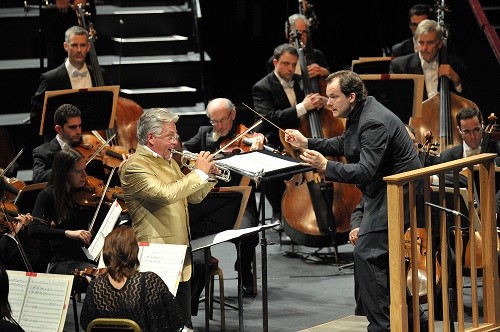 United Kingdom Prom 49 – Dean, Mahler: Håkan Hardenberger (trumpet). Boston Symphony Orchestra/Andris Nelsons (conductor). Royal Albert Hall, London, 22.8.2015. (CC)
United Kingdom Prom 49 – Dean, Mahler: Håkan Hardenberger (trumpet). Boston Symphony Orchestra/Andris Nelsons (conductor). Royal Albert Hall, London, 22.8.2015. (CC)

with the Boston Symphony Orchestra conducted by Andris Nelsons
c Chris Christodoulou
Brett Dean – Dramatis personae (Proms premiere)
Mahler – Symphony No. 6
Brett Dean’s Dramatis personae (2013) for trumpet and orchestra pays homage to the idea of a superhero, but does so with a depth that Michael Daugherty could never approach. (He is the obvious composer to invoke in these circumstances, with works under his belt like the Metropolis Symphony). The solo trumpeter is the principal protagonist over the three movements of this half-hour work. Dean’s demands on his soloist verge on the unreasonable, in terms of stamina and in terms of range, if it was not for the fact that the soloist was Hardenberger, for whom the work was written. This was the first Proms performance; the UK premiere was in Birmingham last year, and in London the piece has been tackled by the BBCSO.
From the barely audible percussion clicks of the opening (a modernist cliché by now, unfortunately), the work develops into a score of the utmost complexity. Nelsons clearly had its measure. The soloist has to use pretty much all the tricks up his sleeve, including flutter-tonguing and a variety of mutes. If in the first movement “Fall of a Superhero”, the age-old concerto basis of hero-soloist against tutti mob (the orchestra) is played out viscerally then the long, muted trumpet line that opens the central “Soliloquy” came as some sort of balm. Even here, though, there were hints of an unsettled undercurrent that did not take long to rise to the surface. A technique of starting a note straight then introducing flutter-tonguing as the note progresses is clearly part of Dean’s expressive palette here; also in this central panel, a trombonist is moved across the orchestra, presaging Hardenberger’s own movement later (he joins the orchestral trumpet section in the finale).
If the first two movements are unremittingly serious, an Ivesian marching band indicates that all is not so straight-laced in the finale, “The Accidental Revolutionary” (the title makes reference to Charlie Chaplin in the film Modern Times). The performance was a huge success, particularly the latter two movements. In the finale, Dean’s bright scoring seemed perfect for the Bostonians’ sound; and it was Nelsons’ expert ear that kept all the different lines from the orchestra clearly differentiated. The pronounced gestural aspect of the finale was given its full due by both soloist and orchestra. The piece is magnificent, not a second too long for its duration. Dean clearly knows what he wants to say and exactly how to say it. This was far more than an “opener” prior to the Mahler.
And so to Mahler’s Sixth Symphony. Here the sheer orchestral perfection of the Boston Symphony shone through, with perhaps an odd exception: the solo horn player, James Sommerville, too often sounded just barely in control of his instrument and at other times tended towards approximation. Nelsons chose to put the Scherzo second, a decision which seems to make the Scherzo into a grotesque prolongation of the first movement.
If the opening march was blunted somewhat, one listened with awe at so many aspects of this first movement: the stunning, clarion first trumpet of Thomas Rolfs, the sweet solo violin of concert-master Malcolm Lowe, the superb trombone trudge of the coda against heavy, low strings, and throughout the glowing oboe solos of John Ferrillo. Nelsons’ Mahler is heavily gestural and, yes, atmospheric. He also has a superb rapport with this orchestra; subtle tempo manipulations in the second movement were minutely managed, with Luftpausen both natural and precise. The Fafner-like slitherings of the Trio were a real high-point (or should that be low-point?) here.
The transparency of the strings in the slow movement was a thing of wonder; This Austrian idyll features cowbells which were placed a good way away, almost a dream-shadow of a rural scene. If the strings were a touch too careful at the opening of the huge finale, Mike Roylance’s tuba was magnificent. The hammer blows were delivered by a simply huge hammer onto a resonant wooden box. It was here in this finale that Nelsons came into his own. It is a vast canvas, and one that Nelsons painted in masterly fashion. The final orchestral outburst carried the impact of a proper Urschrei, a real soul cry, before the music dissolved in on itself. So why, after such a telling close, did the applause begin so immediately? The impact of that cataclysmic ending – almost a symbolic hammer-blow in itself – was immediately shattered.
Obviously (one would hope this was self-evident), there was no encore. This was a terrific opportunity to experience a top-tier orchestra; there is no doubting Nelsons is a superb conductor (he also impressed in a simulcast of Der fliegende Holländer from Covent Garden in February this year). The second of the Bostonians’ Proms includes Shostakovich’s Tenth Symphony, a work Nelsons has recently recorded with these forces. It will be, I am sure, a fascinating experience.
Colin Clarke


Nelsons invigorates the orchestra for the first time in my lifetime. I am 69. Despite the Boston and New York naysayers (endemic in Boston), he is a breath positive air in a negative environment. Thank God Boston audiences as well as UK and European audiences appreciate his musical insight and abilities. The American critics will catch up.
It was a thrilling Prom – once we’d got past the Brett Dean piece. I agree with Colin’s verdict on the Mahler performance. Clearly Nelsons is establishing the sort of exciting relationship with the Boston Symphony that he had from the outset with the CBSO. Lucky Boston.
Colin is absolutely right to protest at the immediate outbreak of applause at the end of the symphony, which began even before the last pizzicato note had been allowed to decay naturally. To describe this as insensitive would be a major understatement. It should have been obvious to everyone that Nelsons was seeking to hold the moment yet a number of Promenaders thought they knew better. I attended a performance of this symphony that Nelsons conducted in Symphony Hall, Birmingham with the CBSO earlier this year. There too Nelsons held the moment at the end but on that occasion the audience paid him, the players and Mahler the compliment of waiting until he relaxed before applauding. Would that the Promenaders had been similarly considerate – and similarly understanding of the music!
I was delighted with the Boston players performance and so pleased to have heard the glorious string section in the slow movement. Having the slow movement follow on from the scherzo seemed just right, for it made the impact of the last movement even more dramatic and contrasting. London needs to have a new concert hall with a great acoustic where the glories of these great orchestras can be revelled in.